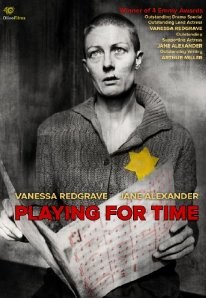Playing for Time (film)
| Playing for Time | |
|---|---|
 |
|
| Genre | Drama Music |
| Written by | Arthur Miller Fania Fénelon ( autobiography The Musicians of Auschwitz) |
| Directed by |
Joseph Sargent Daniel Mann |
| Starring |
Vanessa Redgrave Jane Alexander |
| Music by | Brad Fiedel |
| Original language(s) | English |
| Production | |
| Producer(s) |
Linda Yellen John E. Quill Bernard Sofronski Louise Ramsay (associate producer) |
| Cinematography | Arthur J. Ornitz |
| Editor(s) | Jay Freund |
| Running time | 150 min. |
| Production company(s) | Szygzy Productions |
| Distributor | CBS |
| Release | |
| Original network | CBS |
| Original release |
|
Playing For Time is a 1980 CBS television film, written by Arthur Miller and Fania Fénelon, based on Fénelon's autobiography, The Musicians of Auschwitz. Vanessa Redgrave stars as acclaimed musician Fania Fénelon.
Playing For Time was based on Fénelon's experience as a female prisoner in the Auschwitz concentration camp, where she and a group of classical musicians were spared in return for performing music for their captors. The film was also adapted as a play by Arthur Miller.
This was the last film of Daniel Mann, who co-directed with Joseph Sargent.
Fénelon, a Jewish singer-pianist, is sent with other prisoners to the Auschwitz concentration camp in a crowded train during World War II. After having their belongings and clothes taken and their heads shaved, the prisoners are processed and enter the camp. Fénelon is recognized as being a famous musician and she finds that she will be able to avoid hard manual labor and survive longer by becoming a member of the prison's female orchestra, Women's Orchestra of Auschwitz.
In the process, she strikes up a close relationship with Alma Rosé, the musical group's leader, as well as the other members of the band. Realizing that the musicians get better treatment than other prisoners, Fania convinces the guards and members of the orchestra that another prisoner she had befriended, Marianne, is actually a talented singer. Although Marianne performs poorly at her audition, she is allowed to join the orchestra. Playing for the Nazis, however, robs the women of much of their dignity and most of them often questioned whether remaining alive was worth the abuse they constantly suffer.
The cast rehearsed together in New York City and subsequently filmed in Pennsylvania on a six-week shooting schedule. During the half-way stage of shooting the producers decided to replace Joseph Sargent with Daniel Mann as director. The singer Martha Schlamme also had a small role, listed as "Woman on train".
...
Wikipedia
